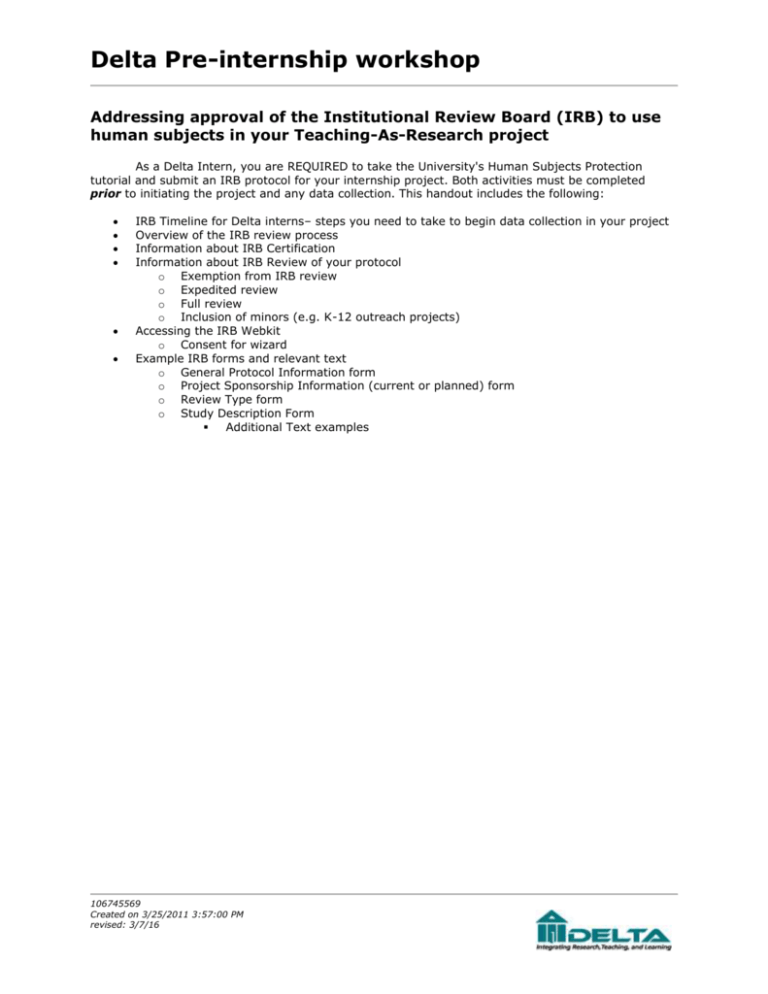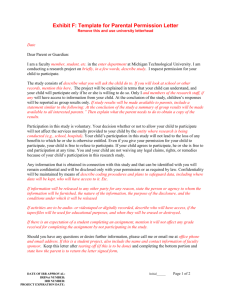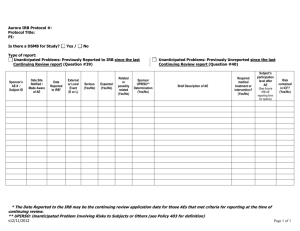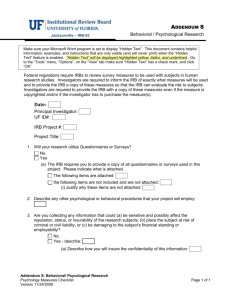IRB
advertisement

Delta Pre-internship workshop Addressing approval of the Institutional Review Board (IRB) to use human subjects in your Teaching-As-Research project As a Delta Intern, you are REQUIRED to take the University's Human Subjects Protection tutorial and submit an IRB protocol for your internship project. Both activities must be completed prior to initiating the project and any data collection. This handout includes the following: IRB Timeline for Delta interns– steps you need to take to begin data collection in your project Overview of the IRB review process Information about IRB Certification Information about IRB Review of your protocol o Exemption from IRB review o Expedited review o Full review o Inclusion of minors (e.g. K-12 outreach projects) Accessing the IRB Webkit o Consent for wizard Example IRB forms and relevant text o General Protocol Information form o Project Sponsorship Information (current or planned) form o Review Type form o Study Description Form Additional Text examples 106745569 Created on 3/25/2011 3:57:00 PM revised: 3/7/16 Pre-internship workshop - IRB Process IRB Timeline for Delta interns Action Date due Obtain Certification by taking the University's Human Subjects Protection tutorial on-line. (NOTE: both Interns and partners must do this) Print out and save a copy of your IRB Certification. Submit an IRB protocol for your project. Prior to submission of an IRB protocol Turn into the Delta Internship Program during the seminar A minimum of 4-8 weeks prior to the beginning of any data collection for your project Upon receiving notification of approval or exemption from the IRB Turn into the Delta Internship Program during the seminar Begin data collection for your project. Submit a copy of your IRB Certification and protocol approval to the Delta Internship Program. Note: You should plan on the approval/exemption process taking a minimum of four weeks, so you will need to plan accordingly. If, for example, you want to collect data about student learning through a pre-survey at the beginning of the semester, you will need to have IRB approval or exemption in place before that time. Overview of the IRB review process: IRB Certification via on-line tutorial Write IRB protocol General Protocol Information form Project Sponsorship Info form Review Type form Study Description form Upload relevant assessment instruments (e.g. surveys) Use consent form wizard & create project-specific consent form; upload Submit protocol for IRB review Upon notification of exemption or approval: - begin data collection - notify Internship Pgm Note: Both Delta interns and their faculty/staff partners are required to complete the online IRB Certification prior to creation and submission of a project protocol. 2 Pre-internship workshop - IRB Process Information about IRB Certification You can access the University's web site at http://info.gradsch.wisc.edu/research/compliance/humansubjects/ for more information on this subject. There is a link to an on-line version of the tutorial at Step #2: Take required training (Human Subjects Tutorial (on-line) link). See below for anticipated changes to the Certification process that may affect you in the future. As detailed in the above table, you and your internship partner MUST complete the tutorial BEFORE initiating the project and any data collection. You will also need to complete the tutorial in order to submit your protocol to the IRB. Once you have taken the on-line IRB certification, you will need to send the following information to the current Education IRB Program Associate. Check here: http://www.grad.wisc.edu/research/hrpp/edirb/ed.ContactInfo.html 1. 2. 3. 4. 5. Your name UW net ID Campus address Campus phone # E-mail address Tell him/her that you need to be added to the webkit database. Your Internship partner can give you security clearance in a protocol once you have been added to the database. You should also plan to print out a copy of your IRB Certification to turn into the Delta Internship Program. Information about IRB Review of the protocol Most Delta Internship projects will involve research conducted in established or commonly accepted educational settings, involving “normal educational practices”, such as: 1. research on regular and special education instruction strategies, or 2. research on the effectiveness of or the comparison among instruction techniques, curricula, or classroom management methods. Exemption from IRB review Because you will likely be doing what constitutes normal educational practices, your IRB protocol is likely to be classified as exempt by the IRB. This status is applied to protocols that are determined to pose no more than minimal risk to study participants. If a protocol is determined to be exempt from review, it is not subject to continuing review or other rules governing human research, such as the rules on informed consent.1 Even if you believe that your project falls into this category, you will still need to submit an IRB protocol. 1 Go to: http://www.grad.wisc.edu/hrpp/view.php?id=10024&f=htm for the categories of research that may be exempt from IRB Review, information downloaded 7/5/07. 3 Pre-internship workshop - IRB Process Expedited review If your protocol is not exempt, but still uses primarily normal educational practices, it may qualify for expedited review. An expedited review procedure consists of a review of a research protocol by the IRB chair or by one or more experienced IRB members. Categories of research that may be reviewed through this procedure include2: Collection of data from voice, video, digital, or image recordings made for research purposes. Research employing survey, interview, oral history, focus group, program evaluation, human factors evaluation, or quality assurance methodologies Research on individual or group characteristics or behavior (including, but not limited to, research on perception, cognition, motivation, identity, language, communication, cultural beliefs or practices, and social behavior) Full review Few, if any, Delta Internship Projects require full IRB review. Information about this process can be found at the UW IRB website at: http://www.grad.wisc.edu/hrpp/view.php?id=10083&f=htm Inclusion of minors (e.g. K-12 outreach projects) Projects that involve informal science education and outreach in the schools or other settings will face the issue of collecting data from children. Most commonly, children participate in research only if there is no greater than minimal risk to them and the IRB finds adequate provisions are made for soliciting the consent of the parents or guardians of children and the assent of the children. 3 These projects may still qualify for exemption from IRB review, particularly if they involve normal educational practices. A protocol must still be submitted. Accessing the IRB Webkit The Wisconsin Center for Education Research has prepared a thorough “IRB WebkitTutorial”. This document will step you through the UW Human Research Protections Program web page and the initial steps of the on-line submission process. This resource can be found at: http://www.wcer.wisc.edu/grantServices/propPrep/tutorial_1.php If you have additional questions after reading through the material that follows, the IRB has also created a thorough “Webkit Instructions Reference Manual”. This document can be found at http://www.grad.wisc.edu/research/compliance/humansubjects/WebKitInstructions.pdf Note: for an intern to create a protocol using the on-line forms, the PI on the project will have to grant them access. 1) From the list tabs of available Forms, select “Security” (step 9 in the WCER handout). To grant another person access to this protocol, click the "Grant Access" button. If they have been certified, their name and contact information should appear in your search. If not, contact the Delta Program at internship@delta.wisc.edu for help. 2 Go to: http://www.grad.wisc.edu/hrpp/view.php?id=10092&f=htm for the categories of research that may undergo expedited review, information downloaded 7/5/07. 3 Go to: http://www.grad.wisc.edu/hrpp/view.php?id=10096&f=htm for information about collecting data from children, information downloaded 7/5/07. 4 Pre-internship workshop - IRB Process Consent form wizard There is an on-line consent form wizard that will allow you to create an informed consent form for your project. You can access it via a link at “7. Plan for Informed Consent and HIPAA Authorization” on the main IRB page, or by going to the following URL: https://rcr.gradsch.wisc.edu/cfwizard/start.asp?wisc Note: Delta interns and their partners have typically submitted proposals through the Education IRB. 5 Pre-internship workshop - IRB Process Example IRB protocol Text from an example IRB protocol is included here to help you think about language you might want to use to frame your project. Look to the text boxes throughout for specific comments about individual forms. This form can be accessed on-line at the University's web site at http://info.gradsch.wisc.edu/research/compliance/humansubjects/ General Protocol Information form Make sure that you give yourself 4-6 weeks after you submit to the IRB office before your project starts. Also, give yourself at least 1-2 years to complete the project (under duration). 6 Pre-internship workshop - IRB Process E-mail the Internship Program coordinator if you plan to collaborate with researchers from a different campus. 7 Pre-internship workshop - IRB Process The internship partner will serve as the PI The intern will serve as the co-investigator Once you complete this form, go on to the Project Sponsorship Information form. 8 Pre-internship workshop - IRB Process Project Sponsorship Information (current or planned) form Consider using text similar to what follows for Question #4 above about funding. “The instructional materials will be developed by INTERN’S NAME during an internship with the Delta Program in Research, Teaching and Learning (Delta; www.delta.wisc.edu) at UW-Madison. This program provides teaching professional development activities for graduate students. INTERN’S NAME will participate as an intern as part of his/her Delta Certificate requirements. More information on the Delta Internship Program can be found at the following URL: http://www.delta.wisc.edu/programs/internship/internship_guide/intern ship1.html Once you complete this form, go on to the Review Type form. 9 Pre-internship workshop - IRB Process Review Type form Projects are typically exempt. 10 Pre-internship workshop - IRB Process Yes, if a K12-focused project You will likely be checking “Yes” to Question #7a. Yes, for example, if your project is situated in a class that you are TA- Once you complete this form, go on to the Study Description form. 11 i n g Pre-internship workshop - IRB Process Study Description Form Note: Text examples, particularly where the fields have been truncated in the image below, can be found following this recreated form. 12 Pre-internship workshop - IRB Process 13 Pre-internship workshop - IRB Process 14 Pre-internship workshop - IRB Process 15 Pre-internship workshop - IRB Process Additional Text examples: ABSTRACT (Be sure to include specific aims of your study) As new technologies arise and become commonplace, new curricula must be designed to teach students about these technologies. To increase student exposure to renewable fuels topics, new lecture and laboratory materials were created for general chemistry classes at Madison Area Technical College (MATC). These materials were developed during an internship with the Delta Program at UW-Madison. Stephanie Britton worked in collaboration with Ken Walz and Holly Walter Kerby, faculty members at MATC, to produce and test these materials. The effectiveness of the materials was tested by giving students pre- and post-tests to gauge what they learned from the lecture and lab materials - all normal educational practices to improve classroom teaching and student learning. All students participated in the laboratory activities, which were mandatory. Students who elected to complete the inclass activities based on the lecture material and fill out the pre- and post-test surveys were awarded points. All students were given equal opportunity to earn these points. The pre- and post-test surveys will be studied with any identifying information removed, so as to protect student confidentiality. Because pre- and post-test and laboratory activity results will be compared, student identifiers will be replaced with random numeric identifiers. We expect that the results will be aggregated prior to publication. The specific aims of this study are to: 1) Analyze the correctness of the existing data (e.g. student responses in the pre-test to the post-test responses); 2) Use this analysis to revise the afore-mentioned instructional materials; 3) Prepare a manuscript for peer review, or a presentation of data for disciplinary meetings, based on our analysis, that details these instructional materials and their benefits for student learning. STUDY DESIGN AND METHODS Inclusion Criteria Participants included all students registered for the courses taught by Ken Walz and Holly Walter Kerby at MATC (a class for science majors and a liberal arts chemistry class, respectively) during the fall semester, 2006. Justify the number of participants (sample size) entered above.* Of the two classes involved in testing the educational materials, one has a registration limit of about 30 students, and the other has a registration limit of 20 students. Role of Participants This study will use existing data. The data was collected during the fall of 2006. Normal educational practices were in use to improve instruction about biodiesel. The laboratory exercise asked students to synthesize biodiesel, characterize it, and compare its properties to those of other compounds. This activity took place in the regularly-scheduled laboratory during the fall semester, 2006. The lab activity required only as much time as any normal laboratory exercise would. The students were asked to read a one-page document and complete a few questions as a pre-lab exercise in preparation for the class period. The students then completed a two- or three-hour lab activity depending on which class they were enrolled in. The length of time varied for the liberal arts chemistry class versus the class for science majors. The post-lab analysis was also typical in difficulty and length for the class. The lecture materials varied by class. The materials developed for a chemistry class for science majors 16 Pre-internship workshop - IRB Process included a hands-on activity where the students manipulated molecular models to work through the biodiesel reaction and more fully understand what occurred during the lab activity. This took place during a regularly scheduled lecture period in the usual classroom. The pre- and post-test surveys were completed out of class but did not require more time to complete than a typical class assignment. The lecture materials for the class for liberal arts majors included an online learning object about renewable fuels. The students were asked to complete the post-test worksheet while working through the learning object and then to fill out a survey about their satisfaction with the learning object. Those students who did not attend class on the day the learning object was administered were given the website address and worksheet so they could complete the activity on their own time. In this way, all students had the opportunity to earn the points from the post-test and satisfaction survey. These materials were completed in one 50-minute class period. Those students who completed the learning object on their own time would not have required more than 50 minutes to complete the exercise. The satisfaction survey was completed by most students in five minutes or less. No deception was involved in any of these activities. Students were given clear instructions for completing the pre- and post-tests and the lecture and lab activities. Confidentiality will be maintained by removing any identifying markers from the preand post-test results and the results of the satisfaction survey. This will be done by the supervising instructors at MATC, Ken Walz and Holly Walter Kerby, before the existing data is given to Stephanie Britton and Don Gillian-Daniel to be analyzed and the results aggregated for publication. Compensation The students received points that were factored into their final grade for turning in the pre- and post-tests and the satisfaction survey, if they were asked to complete one. The laboratory pre-lab and analysis questions were graded on the same scale as all of the other laboratory exercises for the course. Sites The project that produced the data that will be used in this study occurred in classrooms and laboratories at the Madison Area Technical College during the fall of 2006. Measurement Procedures The teaching materials will be evaluated, and their success determined or measured by comparing the correctness of the student responses in the pre-test to the post-test responses. Steps to Minimize Risks All identifying markers will be stripped from the pre- and post-test data. Results, when they are presented, will occur in aggregate. Possible Benefits to the Participants Future students who are exposed to these or similar educational materials will learn about renewable fuels and will be able to make informed choices about buying renewable fuels for their own use. Benefits to Society Disseminating objective information about renewable fuels and their benefits and drawbacks will help to counteract the misinformation being distributed by groups with an interest in encouraging or dissuading renewable fuels use. 17







